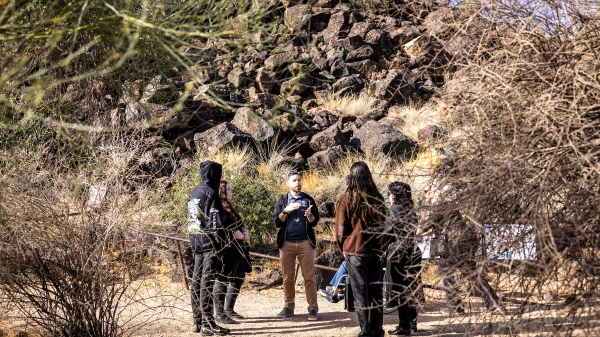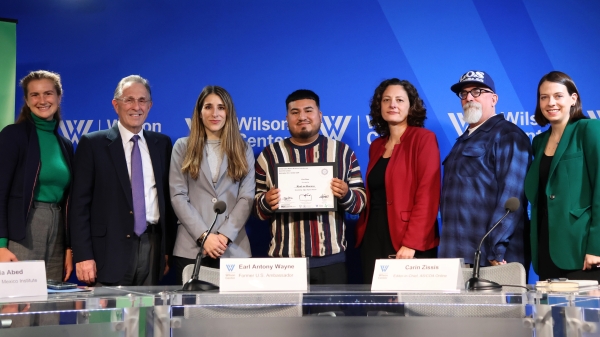ASU Dean’s Medalist to continue her passion for linguistics to show the world the beauty of classics

Elisa Jennings will graduate this May with a double major in classics (ancient Greek concentration) and English linguistics.
Editor's note: This story is part of a series of profiles of notable spring 2021 graduates.
In May, Illinois native Elisa Jennings will graduate with a double major in classics (ancient Greek concentration) and English linguistics. Jennings has been a Barrett, The Honors College student and earned a 4.0 GPA while at ASU, among numerous other achievements to the ASU’s classics community. Because of her contributions and commitment, Jennings has been named The College of Liberal Arts and Sciences' spring 2021 Dean’s Medalist for the School of International Letters and Cultures.
Jennings began her study of Greek in fall 2017 and earned a gold medal on the national College Greek Exam. During her time at ASU, Jennings did not see herself in competition with other students, but as collaborating with them. As a result, every course she was in had a special communal spark to it.
In addition to being a highly accomplished undergraduate philologist, Jennings also pursued a deeper breadth of knowledge about the field by taking a range of other classics. Furthermore, she served as the head grader and tutor in the classics program, helping train and guide her colleagues.
Jennings has been essential not only to the intellectual life of the classics program but to its extracurricular activities. She has given mini-lessons at the Foreign Language Fair, written attendees’ names in ancient Greek at Homecoming and Open Door, assisted at Fall Forum and leading the student organization Solis Diaboli (Latin for “Devils of the Sun”) and revitalized it by holding game and trivia nights that appeal to students outside the classics program.
“Not only is Jennings a talented, enthusiastic and dedicated student, she has made us better teachers," said Sarah Bolmarcich, senior lecturer of classics in the School of International Letters and Cultures. "She has pushed us with her questions and inspired us with her dedication just as we have pushed her with assignments and academic challenges. She has made profound contributions to the classics community at Arizona State as our student, as a grader and a tutor for our classes, and as a leader in extracurricular activities. She is a superlative representative for ASU, The College, humanities, SILC, and the classics program. Jennings isn’t just a member of the classics community at ASU; she is a leader of it and the result has been an even tighter-knit community, giving support to our students in troubled times.”
After graduation, she will pursue a master’s degree program at the University of Illinois at Urbana-Champaign. She aspires to teach Latin and Greek at the high school level.
We met with Jennings (virtually) to ask a few more questions about her experience at ASU and to learn more about her future plans:
Question: What was your “aha” moment, when you realized you wanted to study the field you majored in?
Answer: I always loved Latin. I got into Latin classes as soon as I could in high school, and my first Latin teacher ever was a man named Jim Horan. He was really brilliant and funny and charismatic, and he would get off on tangents all the time, talking about how a certain Latin word compared with an ancient Greek word or evolved from proto-Indo-European, and then how it evolved into French and got borrowed into English. I suddenly saw everything as being connected, language itself becoming like this crazy unified web of connection between all human beings since language is everywhere and has such an intense cultural memory and history about it. My mind was totally expanded. He explained that studying language change and mechanics was called “linguistics,” and so that’s what I chose as my first major.
Mr. Horan wound up dying in a car crash my last semester of high school, a few months before I graduated. On my first day of choosing classes, I was asked to choose a language. I already knew Spanish and Latin, and I wanted a new challenge. I remembered how Mr. Horan knew all this stuff about ancient Greek, and so I chose ancient Greek as my major so that I could in a way pay my respects to him and all the wealth of knowledge that was lost when he died.
I loved my Greek 101 class with Dr. Bolmarcich so much that within a few weeks of entering, I decided that I would take Greek for the rest of my college career, and so I might as well major in it too. And here I am! Greek and Classics, in general, feel like my life now and Linguistics a fun thing on the side that helps fuel my Greek knowledge.
Q: What’s something you learned while at ASU — in the classroom or otherwise — that surprised you or changed your perspective?
A: I learned almost everything here. It’s really hard to pick apart one thing from my entire college career. If I had to pick one thing, I would pick learning about manuscript tradition. Most of the ancient texts have been rewritten over and over and over again, and we might currently have one original copy or like 10. And the copies aren’t even foolproof because the copyists might try to do things like fixing things they perceive as errors, integrate annotations/notes other copyists had made into the text, or even add their own parts. So, a lot of classics is sort of reconstruction. It’s looking at what is, but also since we must realize we have no native speakers or assurance of an original copy, it’s also about questioning what we have, imagining what could have been, and keeping in mind the millions of things that happen to a text along the way. Sure, "The Iliad" has been read billions of times by billions of different readers. That doesn’t mean you can’t have some brilliant idea and look at it in an entirely new way.
Q: Why did you choose ASU?
A: I chose ASU because my ex-boyfriend went here and I got a really good scholarship, but I stayed because of the brilliant classics teachers and classics community. I didn’t think I could find anything better anywhere else. I felt so nurtured and cared for here that even if Harvard had reached out and had said “Elisa, we want you, will give you a full ride and will fly you out here,” I would have rejected them. The classics community here was priceless.
Q: Which professor taught you the most important lesson while at ASU?
A: Dr. Sarah Bolmarcich taught me that you can be absolutely brilliant and still be wrong sometimes, and that’s OK because there’s no reason to stress. If you keep your feet on the ground and your head on your shoulders, you will find the answer eventually, and all you need to get there is determination and patience with yourself.
I think that if you take yourself too seriously and cringe at every wrong answer you say in class, you won’t have the guts to ask questions and actually learn because you’ll be too busy pretending that you know everything. The best classroom is one founded on questions asked, accepting that there will be wrong answers and that’s totally, absolutely OK.
Q: What’s the best piece of advice you’d give to those still in school?
A: Joy is the most important tool you have to learn. If you can find joy in your classes, the work becomes infinitely more fulfilling and special. And you can find joy in the littlest things. I really like making syntax diagrams for my Latin and Greek classes. They’re all color-coded and pretty, and I feel at peace when I know the material well enough to make them.
And of course, there are those classes that are simply unenjoyable, ones you just need to take for the credit or to get the prerequisite you need. If you need to take an unenjoyable class, limit it to one a semester. You can have one class a semester where you complain about it to everyone around you. But for all your other classes you need to find joy. If you subject yourself to a soul-crushing class after a soul-crushing class, you’re going to graduate with absolutely no soul at all, and your whole time in school will feel like a waste. Don’t waste your time. Find the little bits of joy that make your classes worthwhile.
Q: What was your favorite spot on campus, whether for studying, meeting friends or just thinking about life?
A: It’s hard to think of campus since I’ve been away from it for a whole year now, but I would say the Life Science Building A because that’s the one with all the snakes! I particularly loved the tortoise that was there, and in my head, I named him Herb because that seemed like a good tortoise name. I would also cut through that building every time I needed to get to the LL because Arizona is just too hot not to find little air-conditioned shortcuts, especially when I was trekking all the way across campus.
Q: What are your plans after graduation?
A: In fall 2021, I’m actually going to be starting an MAT in Latin at the University of Illinois at Urbana-Champaign! After all of my time tutoring here at ASU, it really just affirmed that my purpose in life is to show other people how beautiful classics is. I really want to give them the sense of connection that Mr. Horan gave to me in high school.
Q: If someone gave you $40 million to solve one problem on our planet, what would you tackle?
A: Well, I would want to tackle the problem of climate change since I know that that will ultimately help everyone on the planet, but in terms of what I would actually use the money to do, I don’t know. There’s a reason I’m not a political science or entrepreneurship major. But I would probably draw together a committee of educated people who can advise me on the best steps, whether they be trying to draw up a policy that puts a check on the pollution of big corporations, funding more climate-conscious technology, or launching educational ad campaigns across the country.
Q: Any advice for future SILC students?
A: Well, you’re probably a SILC student because you love what you do. So first, good job, give yourself a pat on the back for that. You’re probably a SILC student because you love languages or love to travel, and please continue to do what you love. But there is this persistent thought that language classes are just for fun. But they can be so much more than that. You can change the world with your SILC knowledge, you just need to follow your heart and figure out where you’re needed in the world. It’s a really hard process to go through, figuring out how you’re going to contribute to the universe, but it’s worth it. There are so many haters who think learning languages is useless. Prove them wrong.
More Arts, humanities and education

Petroglyph preserve celebrates 30th anniversary with ancient, modern tales
The Deer Valley Petroglyph Preserve provides a beautiful walk through a pristine desert where chuckwalla lizards are as plentiful…

Kaleidoscope short film contest inspires powerful binational filmmaking in its second year
“We come to this country not to steal anybody’s jobs but to take advantage of the opportunities that the rest ignore. We’ve been…

ASU's Neal Lester reflects on life, death of poet Nikki Giovanni
When Neal Lester heard on Monday that poet and activist Nikki Giovanni had died, the news hit hard.Lester, the founding director…